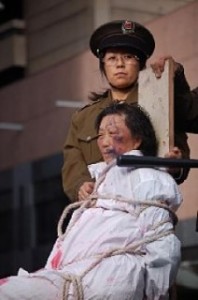Sex Trafficking and China’s One Child Policy
The Chinese Criminal Law defines trafficking as “the abduction, kidnapping, trading, and transporting of women and children for the purpose of selling.” Forced labor and other trafficking-related crimes are punished as other crimes and not as trafficking offenses.
Despite the ambiguity of its laws, China is not blind to the horrific violation of human dignity and rights that befalls victims of sex trafficking. It has recognized that crimes of trafficking in women and children seriously violate the individual rights of women and children and greatly harm the physical and psychological health of trafficking victims.
As such, China has ratified numerous international conventions aimed at reducing the rate of sex trafficking worldwide, including the Convention of the Elimination of All Forms of Discrimination Against Women and the Convention Against Transnational Organized Crime. Moreover, China has developed its own Plan of Action on Combating Trafficking in Women and Children.
Despite all of its good intentions, China continues to have a severe sex trafficking problem. This is due, in no small part, to China’s notorious one child policy. China’s gender imbalance has grown increasingly wide since 1979, when the policy was implemented — estimates indicate that by 2020 there will be 30 million men unable to find wives in China.
China’s one child policy is possibly the most controversial population planning policy in the world. Despite criticisms from human rights organizations, the Chinese government claims the policy has successfully prevented over 400 million births and has helped China achieve its impressive economic growth. When Beijingannounced in November 2013 that it was relaxing the policy (to allow couples in which one of the partners is an only child to have more than one child), human rights activists across the world celebrated while journalists and scholars immediately began speculating why the CCP had suddenly changed its notorious policy.
In trying to understand Beijing’s decision to loosen the one child policy, journalists and scholars repeatedly pointed to two main factors. First, the one child policy has led to extreme imbalances in the male to female ratio. Second, a rapidly aging labor force will increasingly strain China’s welfare safety nets. Many experts argue that because of the one child policy, China will get old before it gets rich.
It is clear that the one child policy has wreaked havoc on China’s demographics. What often goes overlooked, however, is how the one child policy has contributed significantly to the rate of sex trafficking within China and across its borders.
The 2014 Trafficking in Persons Report published by the U.S. Department of State’s Trafficking in Person (TIP) office, stated that women and children from countries like Burma, Vietnam, Laos, Mongolia and North Korea, as well other countries in Africa and the Americas, are subjected to forced labor and sex trafficking in China. Many of these women are recruited through marriage brokers and transported to China, where some are subsequently forced into prostitution or labor.
Moreover, the TIP report explicitly links sex trafficking in China to the one child policy. “The Chinese government’s birth limitation policy and a cultural preference for sons creates a skewed sex ratio… which may serve to increase the demand for prostitution and for foreign women as brides for Chinese men — both of which may be procured by force or coercion.”
In other words, the demand for trafficked women in China is directly related to a shortage of available women. This problem is especially notable in the more rural, poorer areas of China where large numbers of young women migrate to urban areas in search of better economic opportunities. This leaves whole villages with very few women. As a result, many men use marriage brokers to find them wives, whether from other parts of China or from neighboring countries.
One such neighboring country is Myanmar, which serves as one prime source for women trafficked into China. According to a report issued by Myanmar’s Ministry of Home Affairs, 85 out of the 155 trafficking cases in 2009 involved forced marriages, and the largest number of these cases were between Myanmar and China. An analysis of a total of 641 trafficking cases between January 2006 and December 2010 shows that 69.7 percent were for forced marriage, and that China was the destination country for 80 percent of those cases.
Mara Hvistendahl, Pulitzer Prize nominee and author of Unnatural Selection: Choosing Boys Over Girls and the Consequences of a World Full of Men, explained to The Diplomat via e-mail how China’s rising economic power also affects this issue. “Now that China has a bit more spending power, its impact on neighboring countries is even more acute, and women are trafficked internationally as well as domestic[ally],” Mara said.
Recently, the trafficking issue in China has caught the eye of several U.S. Congress members. At a Heritage Foundation event on October 9, Representative Chris Smith (R-NJ) gave a speech listing several reasons why he believes China’s one child policy is the “most egregious act against women ever.” Among those reasons, Smith passionately argued, “Because of the missing girls, China has become the human sex trafficking magnet of the world. Women and young girls from outside the country are being sold as commodities throughout China — a direct consequence of the one child policy.”
Similarly, Senator Marco Rubio (R-FL) recently wrote an article arguing that the lack of birth registration rights available to children born in violation of the one child policy leaves children vulnerable to trafficking and exploitation.
Thus, it is clear that there is a direct relationship between the one child policy and sex trafficking within China and across its borders. This begs the question: Will the recent changes made to the one child policy reduce the rate of sex trafficking in China?
The U.S. TIP office seems to think it will. In 2014 the TIP promoted China from a “Tier 3” to a “Tier 2 Watch List” country in its ranking of governments based on their perceived efforts to acknowledge and combat human trafficking. The report attributes this upgrade to the modification of the one child policy: “In November 2013, the government modified its birth limitation policy to allow families with one single-child parents to have a second child, a change that may affect future demand for prostitution and for foreign women as brides for Chinese men — both of which may be procured by force or coercion.”
Others, however, remain unconvinced. Reggie Littlejohn, the founder and president of Women’s Rights Without Frontiers, told The Diplomat through e-mail, “The fact that the PRC government tweaked the one child policy does not signify that it ‘maintained efforts to prevent trafficking in persons.’”
Furthermore, according to Littlejohn, “Allowing a relatively small number of families to have a second child will not end gendercide or sexual slavery in China.”
Although the relaxation of the one child policy may help to close the gender gap in China, the havoc it has already wreaked on Chinese demographics will not be easily fixed. Until China resolves the problem of the sex ratio imbalance, there will continue to be a black market where women are sold into marriage.
Michelle Clark, an internationally recognized expert on human trafficking and an adjunct professor at George Washington University in Washington, DC, told The Diplomat that China’s sex trafficking problem will not be solved easily.
“It will take at least a generation for the population to begin to stabilize, so for the foreseeable future, Chinese men will go looking for wives in a variety of ways,” Clark said. “Trafficking will certainly be part of the means of provision of brides.”
Unfortunately, despite all of the commotion and celebration surrounding the relaxation of the one child policy last November, sex trafficking will continue to lead to significant issues in China. Perhaps if there was greater discussion on the issue of trafficking of women, in tandem with increased international pressure, China would be incentivized not only to admit the connection between the one child policy and sex trafficking, but also to make a greater effort to combat the problem. Until then, sex trafficking, much like the women affected by it, will remain hidden in the shadows.
Madeline Fetterly is a MA Candidate in Asian Studies and International Development at the Elliott School at the George Washington University in Washington D.C.



No comments:
Post a Comment
Comments always welcome!